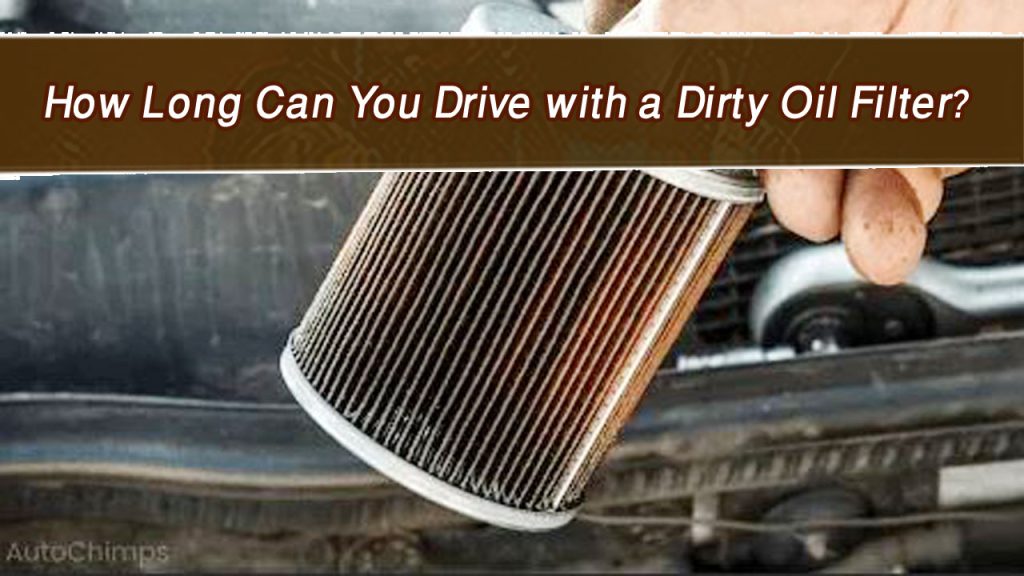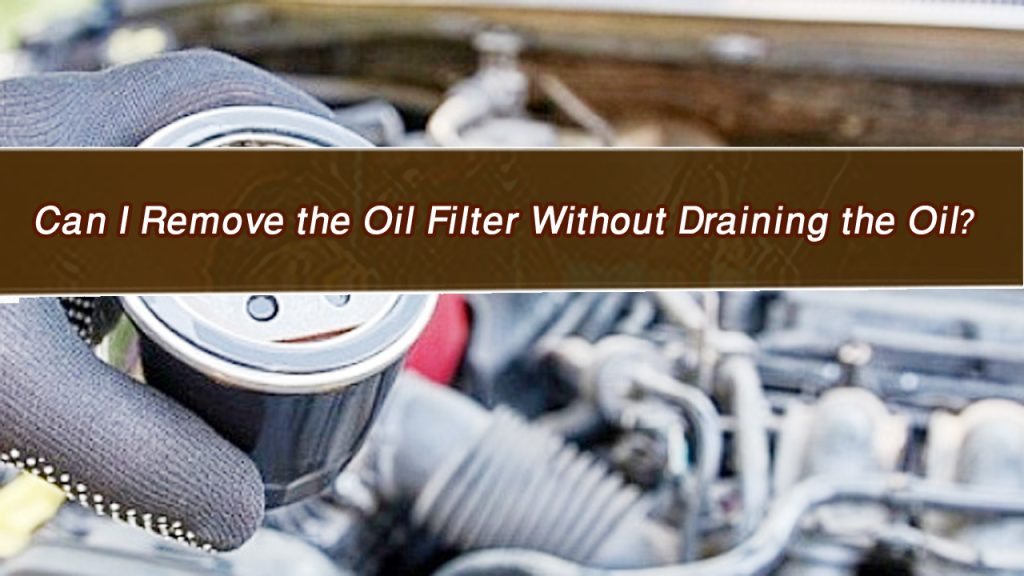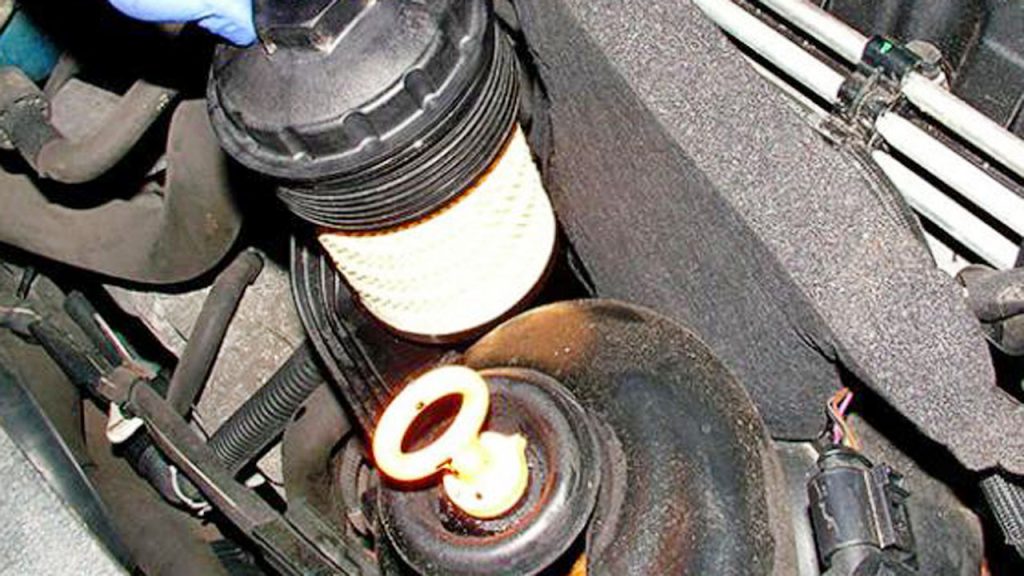Your car’s oil filter might seem like a small and unnoticeable component, but it plays a huge role in keeping your engine healthy. It filters out dirt, debris, and contaminants from the engine oil, ensuring that only clean oil circulates through the system. However, over time, the oil filter can become clogged with the very impurities it’s meant to trap.
If you’re wondering how long you can drive with a dirty oil filter, the answer isn’t straightforward. It depends on factors like your driving habits, the type of vehicle, and how long it’s been since your last oil change. Let’s explore this topic in detail so you can understand why replacing or maintaining your oil filter is so important for your car’s health.

Image by oilchangers
Why Is the Oil Filter So Important?
Before we dive into how long you can go with a dirty oil filter, let’s talk about why this little part is so crucial. The oil filter ensures that:
Contaminants Are Removed: Over time, dirt, metal particles, and carbon residue can mix with the oil. The filter removes these impurities before they can damage the engine.
Oil Flow Is Maintained: A clean oil filter allows oil to flow freely through the engine, which is critical for lubrication and cooling.
Engine Longevity: By keeping the oil clean, the filter helps prevent wear and tear on the engine, extending its life.
Driving with a clogged or dirty oil filter can compromise all of these functions.
What Happens When You Drive with a Dirty Oil Filter?
A dirty oil filter doesn’t just sit there quietly—it can cause a host of issues that may start small but can grow into serious problems if ignored. Here’s what happens:
Restricted Oil Flow
A clogged oil filter restricts the flow of oil, which means less lubrication for engine parts. This can lead to increased friction and heat, both of which are bad news for your engine.
Unfiltered Oil Circulates
Once the filter becomes too dirty, it can no longer trap contaminants. This means dirty oil starts circulating through the engine, potentially causing damage to sensitive parts like pistons and bearings.
Bypass Valve Activation
Most oil filters have a bypass valve as a safety mechanism. When the filter is too clogged to allow oil through, the valve opens and allows unfiltered oil to bypass the filter entirely. While this ensures the engine still gets oil, it also means the oil is dirty and full of debris.
Reduced Engine Performance
With poor lubrication and potential contamination, your engine might start showing signs of reduced performance, like decreased power and lower fuel efficiency.
Long-Term Engine Damage
Dirty oil and poor lubrication can cause significant damage to the engine, leading to costly repairs or even engine failure.
How Long Can You Safely Drive with a Dirty Oil Filter?
Now, the million-dollar question: how long can you keep driving with a dirty oil filter?
The answer depends on several factors:
How Dirty the Filter Is: If the filter is only slightly dirty, you might not notice any immediate issues. But if it’s heavily clogged, even short drives can be harmful.
Driving Conditions: If you’re driving in harsh conditions—like stop-and-go traffic, extreme temperatures, or dusty environments—the filter will clog faster.
Type of Vehicle: Some vehicles are more sensitive to oil quality than others. High-performance or luxury cars may be more affected by a dirty filter.
As a general rule, you should never let your oil filter go more than one oil change cycle without replacing it. That’s usually around 3,000 to 7,500 miles, depending on your vehicle and oil type. If you suspect your filter is dirty, it’s best to address it as soon as possible rather than risk engine damage.
Signs That Your Oil Filter Needs Replacing
How do you know if your oil filter is dirty or clogged? Here are some common signs to look out for:
Low Oil Pressure
A clogged oil filter can restrict oil flow, leading to a drop in oil pressure. If your oil pressure warning light comes on, it’s time to investigate.
Dirty Exhaust Smoke
If you notice black or dirty smoke coming from the exhaust, it could be a sign of contaminated oil or poor combustion, both of which can be linked to a dirty filter.
Poor Engine Performance
Reduced acceleration, lower fuel efficiency, and sluggish performance can all point to issues with oil flow and filtration.
Metallic Sounds from the Engine
When the engine isn’t getting enough lubrication, you might hear grinding or knocking noises. This is a sign of friction between metal parts, which could be caused by a clogged filter.
Oil Contamination on the Dipstick
Check your oil dipstick regularly. If the oil appears gritty or dirty, it’s a sign that the filter isn’t doing its job.
How to Check and Replace Your Oil Filter
Replacing an oil filter is a straightforward task that you can do yourself with the right tools and a little know-how. Here’s a quick guide:
Tools You’ll Need
- New oil filter
- Oil filter wrench
- Fresh engine oil
- Drain pan
Steps to Replace the Oil Filter
- Prepare Your Vehicle: Park on a flat surface and let the engine cool.
- Drain the Old Oil: Place a drain pan under the oil pan and remove the drain plug. Let the oil drain completely.
- Remove the Old Filter: Use an oil filter wrench to unscrew the old filter. Be prepared for some oil to spill out.
- Install the New Filter: Apply a thin layer of fresh oil to the rubber gasket of the new filter, then screw it in place by hand. Tighten it snugly, but don’t overtighten.
- Refill the Engine Oil: Add fresh oil to the engine, checking the dipstick to ensure the correct level.
- Dispose of Old Oil and Filter: Take them to a recycling facility.
Oil Filter Maintenance Overview
| Action | Recommended Frequency | Purpose |
|---|---|---|
| Check Oil Filter | Every oil change | Identify clogs or damage |
| Replace Oil Filter | Every 3,000-7,500 miles | Ensure proper oil flow |
| Inspect Oil Levels | Monthly | Prevent overfilling/low oil |
Tips for Prolonging Oil Filter Life
While oil filters are designed to last for one oil change cycle, you can help them perform better by following these tips:
- Use High-Quality Oil: Premium oil contains fewer impurities, which means less strain on the filter.
- Avoid Dusty Environments: Driving on dusty roads can introduce more contaminants into the oil.
- Follow Manufacturer Guidelines: Stick to your vehicle’s recommended oil change intervals.
- Keep the Engine Clean: Regular maintenance can reduce the amount of debris that reaches the oil.
Conclusion
Driving with a dirty oil filter might not seem like a big deal at first, but it can lead to significant engine problems over time. While you might be able to drive a few hundred miles with a slightly clogged filter, ignoring the issue for too long can result in restricted oil flow, reduced engine performance, and even costly repairs.
The best approach? Stay proactive with your oil filter maintenance. Check it during every oil change, replace it as needed, and pay attention to signs of trouble like low oil pressure or poor engine performance. A small investment in filter maintenance can save you a lot of hassle and expense down the road.
Your car’s oil filter is like its kidney—it filters out the bad stuff and keeps everything running smoothly. Treat it well, and your engine will thank you with years of reliable performance.
FAQs
How often should I replace my oil filter?
Most manufacturers recommend replacing the oil filter with every oil change, which is typically every 3,000 to 7,500 miles.
What happens if I don’t replace my oil filter?
A clogged oil filter can restrict oil flow, reduce engine performance, and cause long-term damage to your engine.
Can I clean an oil filter instead of replacing it?
No, oil filters are designed for single-use and should be replaced when dirty or clogged.
How do I know if my oil filter is dirty?
Signs include low oil pressure, dirty exhaust smoke, poor engine performance, and metallic noises from the engine.
Can a dirty oil filter cause engine failure?
Yes, if left unchecked, a dirty oil filter can lead to poor lubrication, increased friction, and ultimately engine failure.

